100 Unmissable Film4 Movies
21. Howards End (1992)
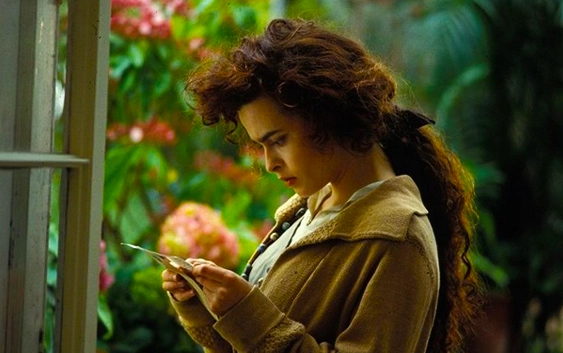
Less than a decade after making her name under the stewardship of director James Ivory in A Room with a View (1985), Helena Bonham Carter reconvened with the period romance specialist for a second film, the more well-known Howards End.
Howards End tells of two sisters in 1910 England navigating relationships that cross divides of wealth and threaten to impose on their independence. Played with striking variety by both Bonham Carter and Emma Thompson (the latter just a few years removed from her breakthrough in Henry V, 1989), the sisters carry enough charisma to hold attention, allowing the depth and complexity of class dynamics, unspoken truths, and other more humanistic and existential elements to come to the fore.
James Ivory’s renowned picture earned 9 Academy Award nominations in 1993, including Best Picture. It won the awards for Art Direction – Set Decoration (Jenny Beaven, John Bright), Adapted Screenplay (Ruth Prawer Jhabvala) and Actress in a Leading Role (Emma Thompson). Ivory himself was nominated for the Palme d’Or at Cannes, earning the 45th Anniversary Prize at the same festival. The film was also an 11-time BAFTA nominee, Emma Thompson winning Best Actress and the film being awarded the British Academy’s award for Best Film. JW
22. The Crying Game (1992)
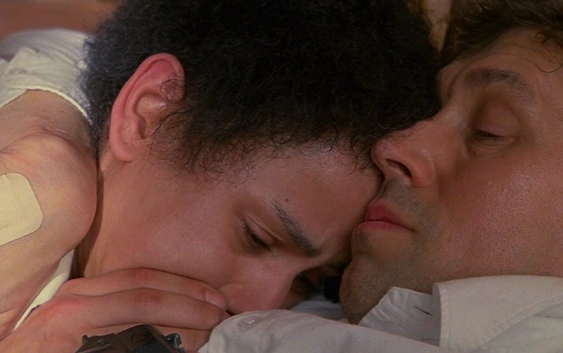
Following success in the 1980s making the likes of The Company of Wolves (1984) and Mona Lisa (1986), writer-director Neil Jordan turned to the genre of the period, the psychological thriller, for The Crying Game (1992), a film about a member of the IRA driven to pursue life in London thanks to a relationship built with a captured British soldier he attempts to help escape.
Adrian Dunbar, Jim Broadbent, Miranda Richardson, Ralph Brown, and Forest Whitaker (who would later win an Oscar for his performance in Film4’s The Last King of Scotland, 2006) are among the recognisable faces in this film, but it is the lead performance of Stephen Rea that truly grabs the headlines. More than a decade ahead of perhaps his most internationally recognisable role as Detective Ian Finch in V for Vendetta (2005), Rea is the anchor of this tense piece and is dragged between pure thrills and drama throughout. It is all so wonderfully crafted that it feels almost naturalistic; quite the achievement for a film of its genre.
The Crying Game earned 6 Oscar nominations in 1993, with Neil Jordan winning the award for Original Screenplay. The film was also a 7-time BAFTA Film Award nominee, winning the distinction of 1993’s Best British Film. JW
23. Raining Stones (1993)
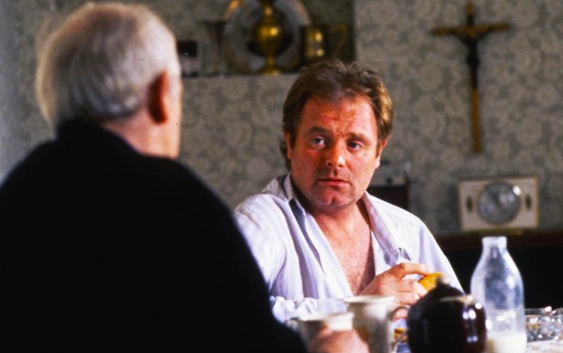
Ken Loach’s 1990s offerings held far more optimism than some of his late-career work, even tales like this one – of a man whose van is stolen and is therefore handicapped in his pursuit of the money needed to feed his family – holding some bold laughs, nods of recognition, and wry smiles.
Remarkably centred around the acting debut of Bruce Jones, who would become well known for his role as Les Battersby on TV soap ‘Coronation Street’ across 884 episodes between 1997 and 2007, Raining Stones covers the spectrum of Ken Loach’s favourite topics: the working class, wealth inequality, institutionalised financial prejudice, issues of state support (or lack thereof), and normal people simply trying to make their way. It is gentle and kind in its perspective, and not as brash as Loach’s usual work in terms of its stance; it’s another unmissable piece of British culture from Ken Loach and Film4.
Ken Loach and Raining Stones were awarded the Jury Prize at Cannes in 1993, whilst also being nominated for that year’s Palme d’Or. The film was also nominated for Best Foreign Film at the 1994 César Awards, and was a nominee for Best British Film at the 1994 BAFTAs. JW
24. Naked (1993)
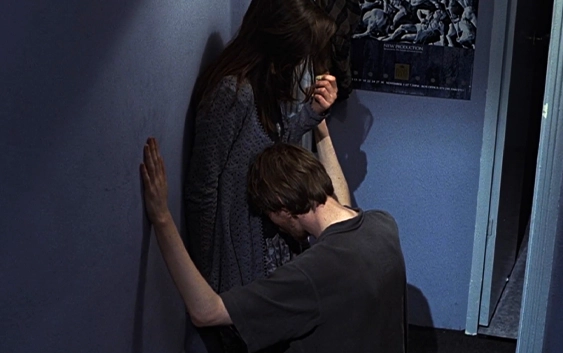
Johnny (David Thewlis), an intellectual but abusive drifter from Manchester, travels to London, reconnects with ex-girlfriend Louise (Lesley Sharp), and proceeds to ruin the lives of her and everyone in her orbit. That is whenever he’s not philosophising to anyone on the street who will listen.
With a detestable and uncomfortably compelling antihero at its head, Naked is a really challenging watch. David Thewlis was given the role of a lifetime after being disappointed at his screentime in Mike Leigh’s previous film, Life is Sweet. The director and star trap you in a vortex of red flags and weaponised philosophical lectures, Johnny’s night-time wandering all lensed with dark Hopperesque beauty by Dick Pope.
Thewlis of course won Best Actor at Cannes to go with Leigh’s Best Director win, though the film eventually missed out on the Palme d’Or. SSP
25. Four Weddings and a Funeral (1994)
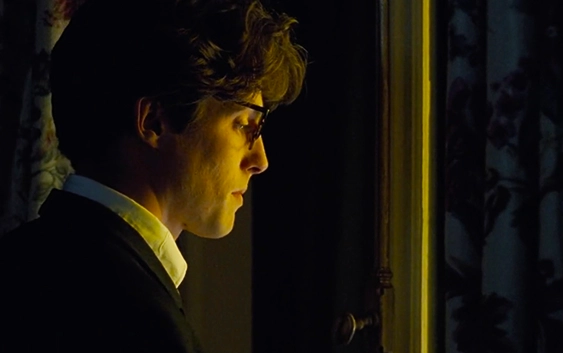
After largely writing for television and being one of the key players in launching Comic Relief (a national broadcast to raise money for charity), would-be Bridget Jones’s Diary writer and Love Actually writer-director Richard Curtis made his feature film breakthrough with Four Weddings and a Funeral, a film that perhaps remains the most typical of his uniquely hyper-British work.
Directed by Mike Newell, who would go on to helm a number of Harry Potter films among other things, Four Weddings and a Funeral tells of a group of twenty-somethings navigating the existential questions of life, death, romance and friendship, and is centred on the career-defining performance of Hugh Grant’s career. It is funny, heartwarming, moving, and utterly unforgettable.
Four Weddings and a Funeral earned Richard Curtis his only Oscar nomination to date (for his work on the original screenplay), and was a Best Picture nominee at the same awards in 1995. It was an 11-time BAFTA nominee, winning Best Film, Best Director, Actress In a Supporting Role (for Kristin Scott Thomas) and Best Actor (for Hugh Grant). JW
26. Ladybird Ladybird (1994)
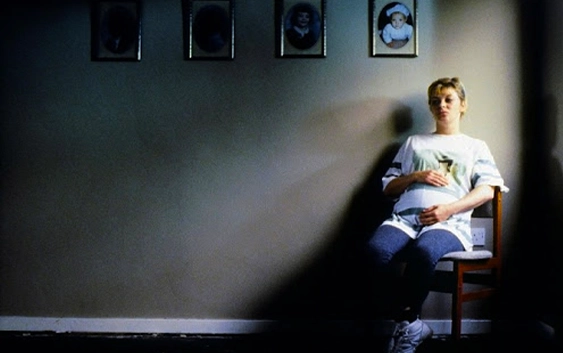
The year after releasing the Palme d’Or-nominated Raining Stones, Ken Loach turned to a story about a young Liverpudlian mother fighting the system to regain custody of her children in London. This debut feature from writer Rona Munro is an at-times painful insight into real life; an element reinforced by how it is an adaptation of true events.
Crissy Rock, as the mother attempting to survive an abusive relationship and the mountains of sexism and governmental red tape that oppresses her elsewhere, is exceptional in her debut screen performance. Loach has always been keen to highlight talents from beyond the traditional casting agencies, and his discovery here is a truly impressive one – you can’t take your eyes off her in this powerful and emotive film.
Ladybird Ladybird was a hit at the 1994 Berlinale, Ken Loach winning the Prize of the Ecumenical Jury for his work and Crissy Rock being awarded the Silver Bear for Best Actress. Rock was also named Actress of the Year at the 1995 London Critics Circle Film Awards. JW
27. Shallow Grave (1995)
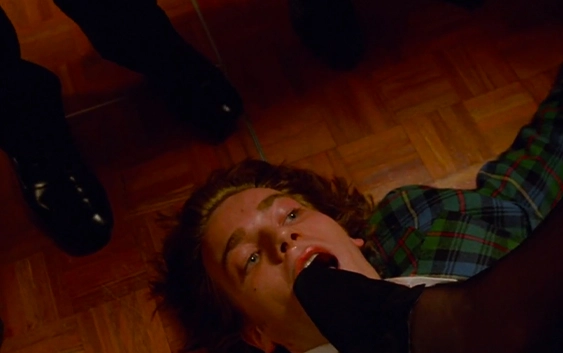
Featuring would-be stars Ewan McGregor and Christopher Eccleston, as well as Kerry Fox, as roommates who find their newly accepted fourth roommate dead and surrounded by cash, and have to battle moral conundrums when deciding what to do with the body and the money, Danny Boyle’s (Trainspotting; Slumdog Millionaire) feature directorial debut is tense and entirely engaging.
Written by John Hodge (Trainspotting; The Beach; T2 Trainspotting), Shallow Grave is a Hitchockian thriller brought to life by a filmmaker in Boyle who would become one of the era’s most respected talents. It is a scintillating feature-length debut and remains one of the director’s most accessible and rewatchable releases.
Shallow Grave was nominated at the BAFTAs for Best British Film and earned Danny Boyle the London Critics Circle award for British Newcomer. Most importantly, it would provide this monumental British filmmaker the springboard needed to make classics like Trainspotting in the years to come. JW
Recommended for you: Danny Boyle Films Ranked
28. The Madness of King George (1995)
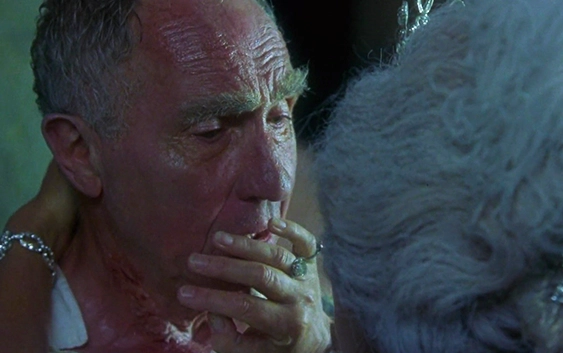
Written by the often praised Alan Bennett and translated to the screen by his regular collaborator Nicholas Hytner – the pair having since worked on the likes of The History Boys (2006) and The Lady in the Van (2015) together – The Madness of King George is an outstanding period piece about late 18th century politics and particularly the mental plight of King George III.
Nigel Hawthorne is outstanding in the titular role, encapsulating one of the most enticing characters of his career with a depth and range of skill so few others are able to achieve. His performance is perhaps the most important of the film’s many exceptional artistic achievements. As his mental state wains, the vultures close to take advantage of the rightful heir they deem to be a pushover, ensuring plenty of plotting and ulterior motives and coercion is weaved through the film’s enticing narrative, and that lots of space is available for supporting actors Helen Mirren, Rupert Graves, Amanda Donohue, Ian Holm and more to showcase their talents.
The Madness of King George was nominated for Actor in a Leading Role (Hawthorne), Actress in a Leading Role (Mirren), and Adapted Screenplay (Bennett) at the 1995 Academy Awards. It won Best Art Direction – Set Decoration at the same ceremony. The film was also nominated for 14 BAFTA Film Awards, winning for Best Makeup/Hair (Lisa Westcott), Best Actor (Hawthorne), and Best British Film. For her performance, Helen Mirren won Best Actress at Cannes in 1995, while the film was nominated for that year’s Palme d’Or. JW
29. Trainspotting (1996)
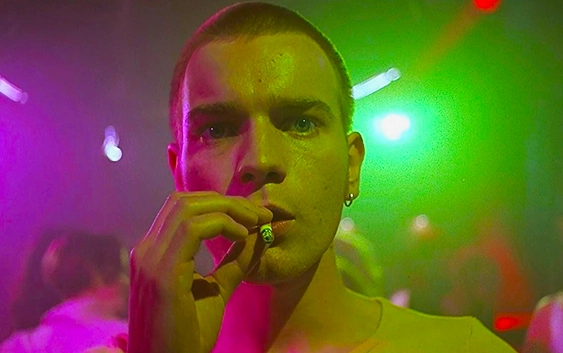
Trainspotting follows the life of Rentboy (Ewan McGregor), formerly Mark Renton, who is heavily into the Heroin counter-culture of 1980s Edinburgh. Alongside his mates, the dim-witted but good-hearted Spud (Ewen Bremmer), the narcissistic schemer Sick Boy (Jonny Lee Miller), the psychotically violent Begbie (Robert Carlyle), and the clean-cut Tommy (Kevin Kidd), Renton funds his habit through petty crime and generally dosses about. Although his grotty lifestyle was a rejection of the meaningless modern consumerist lifestyle, Renton is feeling the urge to kick his addiction after experiencing several all-time lows in a row.
The now infamous toilet scene requires no explanation, but these are the least of his horrors which include accidental underage sex, his friend Spud being incarcerated for shoplifting, and the death of his mate’s infant daughter from neglect. All these come to haunt Renton after his family force him to go cold turkey after an overdose incident – and eventually it seems that he has managed to turn his life around. However, when trying to make a new life for himself in London, his friends Sickboy and Begbie follow him and begin to drag him down again with their theft, violence and of course drug use. When the gang decide to make it big with a drug deal, Renton sees the opportunity to make a get away from this prison; he chooses life.
Trainspotting is one of those movies that is a moment within pop culture. It is a guidepost of everything that was cool in the 1990s. It is one of those films that everyone knows about, even without seeing it, making references to its more infamous scenes. Even US Senator (and previous republican candidate for president) Bob Dole had something to say about – accusing it of glorifying drug use, though he later confessed that he had never actually seen it. Much of this is attributed to the promotional work when it was released – in the steps of Pulp Fiction, Trainspotting modelled itself to the public as vibrant, energetic, and quick-witted: the coolest film to see that year. Alongside its poster campaign and the use of the “Choose Life” speech, the film’s promotional work heavily utilised music – Trainspotting does have one of the most iconic soundtracks of all time, showcasing the very best of both 80s and 90s music.
With director Danny Boyle using Trainspotting to capture a moment that is now contemporary history, the film has helped to establish Boyle as one Britain’s best-known directors. He has since won an Oscar for best director for Slumdog Millionaire (with his subsequent 127 Hours being an Oscar nominee for Best Picture). So much faith was in Boyle for his ability to capture moments in time that he was chosen to direct the now legendary the London 2012 Olympics Opening Ceremony. Additionally, all of Trainspotting’s principal cast of mostly working-class Scottish actors have gone on to be major stars involved in projects including Harry Potter, Pixar’s Brave, Wonder Woman, and The Beach. Ewan McGregor, before the decade was out, got attached to one of the biggest movie franchises in Hollywood history – Star Wars.
Trainspotting’s most significant legacy is the handling of its difficult subject matter. Despite all the controversy, the movie doesn’t glorify drug use; quite the opposite really. Although the narrative takes a neutral approach, it turns out to be quite the cautionary tale on the same level as Requiem for a Dream. The backdrop of Edinburgh in the Thatcher years, in which Maggie herself had destroyed the concept of society, is depressing to anyone in the know, and it ensures that there can only be sympathy for those who developed a serious drug habit in such circumstances. The creation of the consumer class within the 80s is a hideous enough concept to want to rebel from, but the drug scene is depicted ultimately as a loser’s game – a roulette between prison and AIDs. Ironically the coolest British film of the 1990s managed to impactfully say “Don’t do drugs kids!” KD
Recommended for you: 50 Greatest Star Wars Moments
30. Safe (1996)
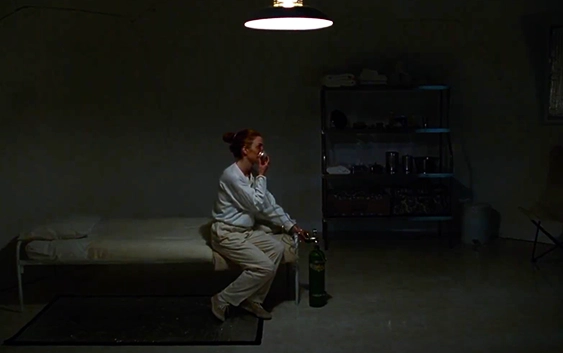
Film4’s reputation for entrusting relatively unknown filmmakers to make the most honest versions of their ideas has brought many of the 20th and 21st century’s great filmmakers into their midst, and in 1996 it was the turn of at-the-time unproven American filmmaker Todd Haynes.
Haynes would later go on to earn critical acclaim for I’m Not There (2007), Carol (2015) and May December (2023), among others, but first established his name with Safe, from 1996. It was here that Haynes would collaborate with Julianne Moore for the first time – with whom he’d make several more films anchored by her critically acclaimed performances – and where the filmmaker’s reputation for melodramatic tales of moral grey areas and human foibles would most definitively be established. Moore is a housewife whose domestic life begins to pose a threat as she develops sensitivities to chemicals in her household objects. It is partly an allegory for the fear of domesticity and a life filled with the same every day activities until time itself runs out.
Safe was nominated for 4 Film Independent Spirit Awards in 1996 – Best Feature, Best Director (Haynes), Best Female Lead (Moore), Best Screenplay (Haynes) – and was nominated for Director, Actress and Best Film at the 1995 New York Film Critics Circle Awards. Most importantly, however, Haynes had established himself as a unique and interesting new voice in the space. JW

